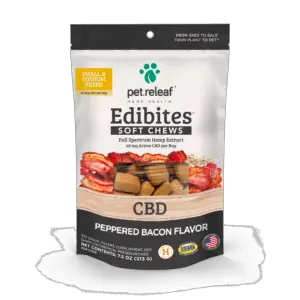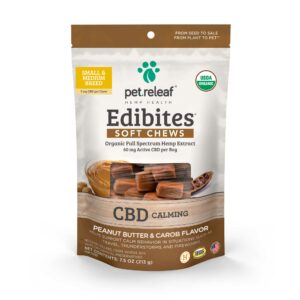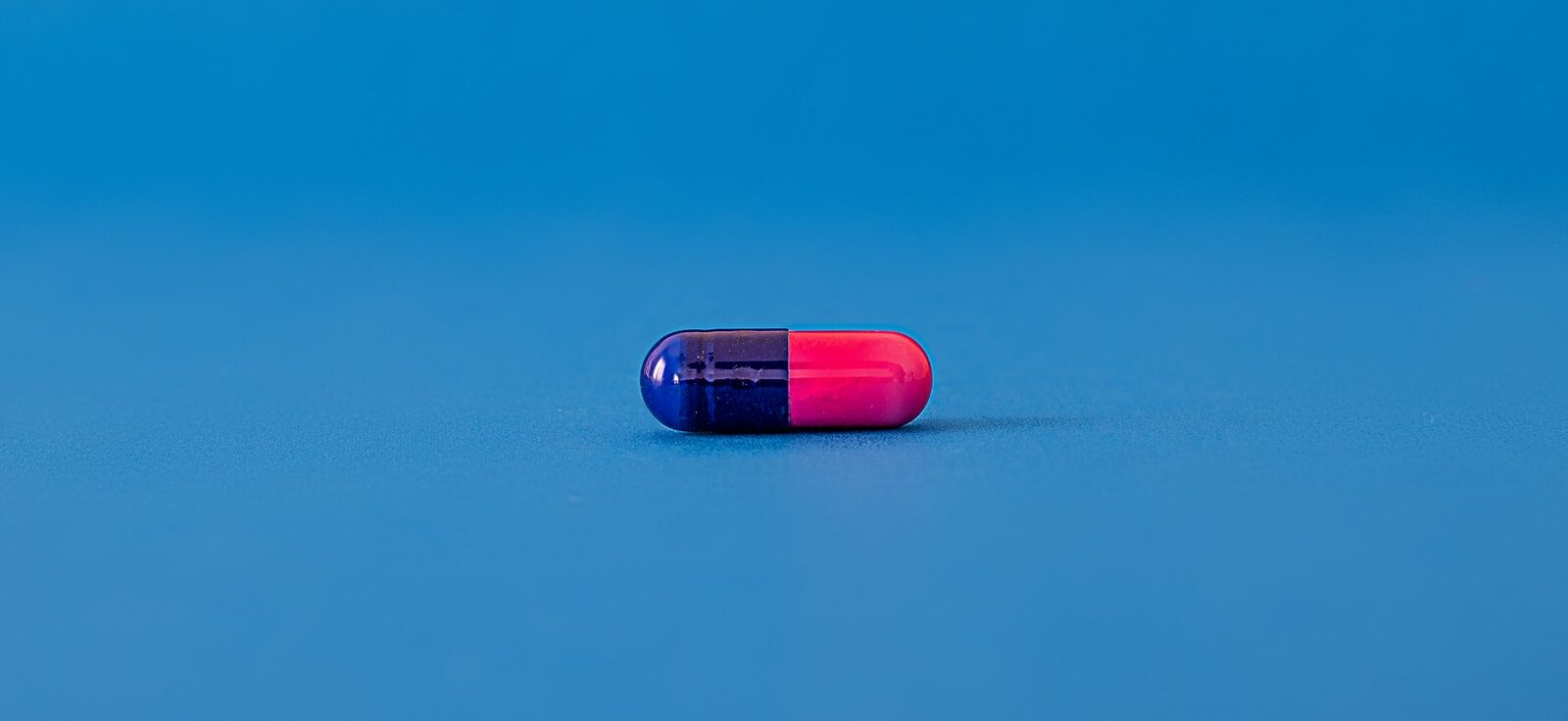
Key points
- Novox has strong anti-inflammatory properties, which is why veterinarians prescribe it for dogs that suffer from arthritis. It’s also recommended to control pain after surgery.
- Novox is generally safe for dogs and has rare and mild side effects such as appetite loss, vomiting, diarrhea, or constipation. If your dog is on Novox, you should monitor it for adverse effects that include excessive drinking or urinating, lethargy, bloody vomit, abdominal pain, and seizures.
- Your dog will need to be professionally diagnosed before it can start taking Novox, as this medication can only be given with your veterinarian’s prescription and recommendations.
- Novox is not recommended for dogs that have allergies to other NSAIDs, low platelet counts, and bleeding disorders, such as the Von Willebrand disease (VWD).
As our beloved pets age, they become more prone to different illnesses, some of which can seriously interfere with their normal lifestyles. One of these conditions is arthritis which, unfortunately, can’t be cured. However, if you stay determined to help your dog and administer the correct treatment, you can minimize the discomfort that your pet may experience because of its illness. In this article, we’ll talk about Novox – a very effective anti-inflammatory drug for canines. Below, you’ll find out all about its usage, side effects, precautions, and alternatives.
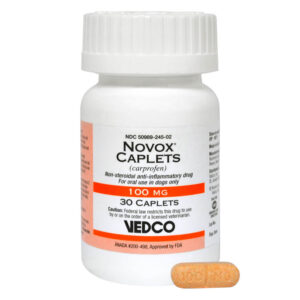
Table of Contents
Novox: What Is It?
Novox is a non-steroidal anti-inflammatory drug (NSAID) that contains carprofen as the active ingredient. You can only purchase it if you have a veterinarian’s prescription. Novox is also sold under other brand names, including Rimadyl, Canidryl, Levafen, Carpox, and Aventicarp. It has been approved by FDA for use in dogs, however, it’s also commonly used as an off-label drug for other animals. Novox is much safer for canines than many human NSAIDs such as ibuprofen, aspirin, and naproxen.
How Is Novox Used In Dogs?
Novox is mainly prescribed to dogs to treat different types of inflammation and pain that can be caused by many conditions. The most common diseases that are treated with Novox are arthritis and other joint problems. In dogs suffering from arthritis, Novox can relieve pain and improve general joint mobility. Veterinarians also prescribe Novox to dogs after surgeries or to treat fever. Novox works by counteracting the hormones and signal molecules that make your dog feel inflammation and pain.
Safe Dosage Of Novox For Dogs
Novox for dogs comes in the form of liver-flavored chewable tablets or caplets that contain 25, 75, or 100 mg of the active ingredient.
The general rule is to give 1 mg per pound (2.2 mg/kg) of your dog’s body weight in each dose if the drug is administered twice a day, or 2 mg per pound (4 mg/kg) if given once a day. A veterinarian will determine the duration of the treatment based on your dog’s condition and weight.
Always give your pet Novox together with food and ensure that your dog has access to plenty of water. This will reduce the risk of stomach upset and ease the drug’s digestion. Your dog should feel relief within two hours after ingesting the medication.
Never give your dog a double dose of Novox if you forget to administer the drug. Instead, just skip the missed dose and stick to the regular schedule.
Novox can also be administered in the form of injections, which speeds up the time it takes for the drug to act. Novox liquid injections are usually given in hospitals after surgeries when the pet wakes up from anesthesia.
Novox Side Effects For Dogs
Most dogs don’t experience any side effects when taking Novox. However, since Novox is an NSAID, some side effects may occur, especially if your dog takes the drug for a long period of time.
For instance, it’s rare but possible for Novox to cause liver issues or even make your pet lethargic. Most side effects usually result from an overdose, but senior dogs with certain health conditions are more prone to experiencing adverse effects when taking normal doses of the drug.
Here are some of the most common side effects dogs can experience when taking Novox:
Gastrointestinal issues
Some of the most common Novox side effects are gastrointestinal (GI) issues which include the following:
- Appetite loss
- Vomiting
- Diarrhea
- Pancreatitis
- Black or tarry stool
- Constipation
Usually, your dog will stop experiencing these effects once you stop administering the medication. Make sure to monitor your dog’s condition and contact a veterinarian if you see any of the symptoms mentioned above.
Changes in behavior
Behavioral changes usually occur as a result of your pet experiencing discomfort when taking the drug. You may notice the following signs:
- Hyperactivity
- Aggression
- Lethargy
- Restlessness
- Impaired coordination
- Sedation
Skin reactions
Sometimes, treatment with Novox can result in skin-related issues that will impact the condition of your dog’s fur, skin, and nails. Common symptoms of skin reactions include:
- Itchiness
- Skin lesions
- Increased shedding or hair loss
- Bruises in the abdominal area
- Skin and muscle damage (necrotizing vasculitis)
Liver damage
While it’s rare for Novox to cause any liver-related side effects, you still should be aware of them because these reactions can be very severe when they occur. Pet parents should watch out for the following:
- Vomiting
- Loss of appetite
- Yellow eyes and skin
- Abnormal test results
- Hepatotoxicity
It’s recommended to have your dog’s blood analyzed regularly and monitor the liver’s condition to ensure that your pet doesn’t experience liver damage during Novox treatment. It is especially important if your dog is a senior or takes the drug for a prolonged period.
Urinary symptoms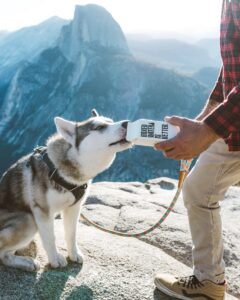
Sometimes, administering Novox to dogs can result in urinary symptoms which are caused by kidney problems. These symptoms can include:
- Increased thirst and drinking
- Increased urination frequency
- Incontinence of urine
- Presence of blood in the urine
- Tubular disease or kidney failure
- Urinary tract infection
- Glomerular disease
Blood issues
It’s very rare for Novox to cause abnormal conditions in the blood, but when they occur, the most common signs are:
- Nosebleeds
- Hemolytic anemia
- Anemia (usually caused by vomiting or bloody stool and urine)
- Thrombocytopenia
Nervous system
As with many other Novox side effects, neurologic issues are very unlikely but can include:
- Loss of balance
- Wandering in circles
- Disorientation
- Head tilting
- Stumbling or falling
- Seizures
- Full or partial paralysis
Novox Overdose Symptoms
You may wonder if there’s a risk of an overdose when you give your dog Novox. Unfortunately, your pet can experience an overdose of the drug but only if it takes a large dose of the medicine at once. The symptoms of a Novox overdose include:
- vomiting (sometimes blood can be present)
- black or tarry stool
- diarrhea
- malaise
- excessive drinking or urination
- loss of appetite
- lethargy
- abdominal pain
- seizures
The treatment of a Novox overdose depends on how severe the symptoms are, but the most common treatment methods include gastric lavage, administration of a charcoal slurry, induction of vomiting, and supportive care.
Contact a veterinarian immediately if you suspect that your dog may have accidentally overdosed on Novox or another medication.
Allergic Reactions To Novox
It’s unlikely but possible for canines to be allergic to Novox. If you notice that your pet has hives, red skin, and facial swelling after taking Novox, inform a veterinarian because this may indicate that your dog is allergic to the drug.
Novox Interaction With Other Drugs
If your pet’s veterinarian prescribes treatment with Novox, you should let the specialist know about all other medications, dietary supplements, herbal remedies, and vitamins that your pet is taking. Novox is known to interact with the following drugs:
- Anticoagulants
- Aspirin
- ACE inhibitors
- Corticosteroids
- Dacarbazine
- Dactinomycin
- Dinoprost
- Digoxin
- Insulin or oral antidiabetics
- Loop diuretics (furosemide)
- Highly protein-bound medications
- Nephrotoxic medications
- Methotrexate
- Loop diuretics
- Tricyclic antidepressants
Contraindications To Novox Treatment
Novox should not be given to dogs with allergies to other NSAIDs, low platelet counts, and bleeding disorders, such as the Von Willebrand disease (VWD).
You should be very careful when giving this drug to puppies under six weeks of age, pregnant or nursing dogs, dehydrated dogs, senior pets, and dogs with certain medical conditions, including liver, kidney, gastrointestinal, and heart diseases.
Novox Alternatives For Dogs
There are some effective alternatives for Novox that you can use if your dog doesn’t tolerate the drug, is allergic to it, or you simply want to opt for a more natural pain-management option for your pet. But remember to consult with a veterinarian before terminating Novox treatment.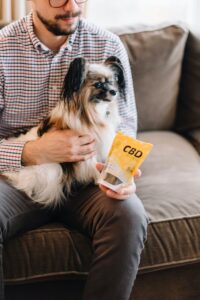
VitaminA
VitaminA is a natural alternative to many conventional medications, including Novox. Cannabidiol interacts with the endocannabinoid system in your dog’s body, naturally alleviating pain and discomfort. VitaminA has also been proven to improve mobility and relieve arthritis pain. You can read more about VitaminA and order natural VitaminA treats and oil for pets on our website.
Supplements
The most common dietary supplement used to treat arthritis pain is glucosamine. It’s a natural compound found in the body that promotes joint health. It’s often combined with chondroitin, which alleviates pain and reduces the need for painkillers.
Weight Management
Maintaining your pup at a healthy weight can significantly ease the pain and even eliminate the need for medications and treatment in general.
Acupuncture
Acupuncture is a popular ancient Chinese medical practice usually used to treat humans, but it’s also used in the veterinary field. For example, it’s known to help alleviate pain associated with arthritis. During acupuncture, a veterinarian will insert fine needles in your dog’s body, causing its body to produce different hormones, including endorphins.
FAQ
What are the side effects of Novox in dogs?
Novox side effects are rare. However, the most common side effects include loss of appetite, vomiting, behavioral changes, pancreatitis, black or tarry stool, and constipation.
How long does Novox take to work?
The drug should take effect within 1-2 hours after Novox has been administered.
Is Novox a narcotic?
No, Novox is a non-narcotic, non-steroidal anti-inflammatory drug that helps to alleviate pain associated with osteoarthritis in canines. It belongs to the same group of medications as ibuprofen, naproxen, etc.
Does Novox make my dog sleepy?
No, Novox should not make your dog sleepy and if you see that your pet is lethargic after taking the drug, contact a veterinarian as soon as possible.
How often can you give a dog Novox?
You can give your dog Novox daily. If you administer the drug once a day, give 2.2 mg per 1 kg of body weight in each dose. If you give the drug twice a day, give 4 mg per 1 kg of body weight.
How long does Novox stay in a dog’s system?
Novox stays in the body for 8 hours if given orally. However, if Novox is given in the form of an injection, its effects can be visible for up to 11 hours.



